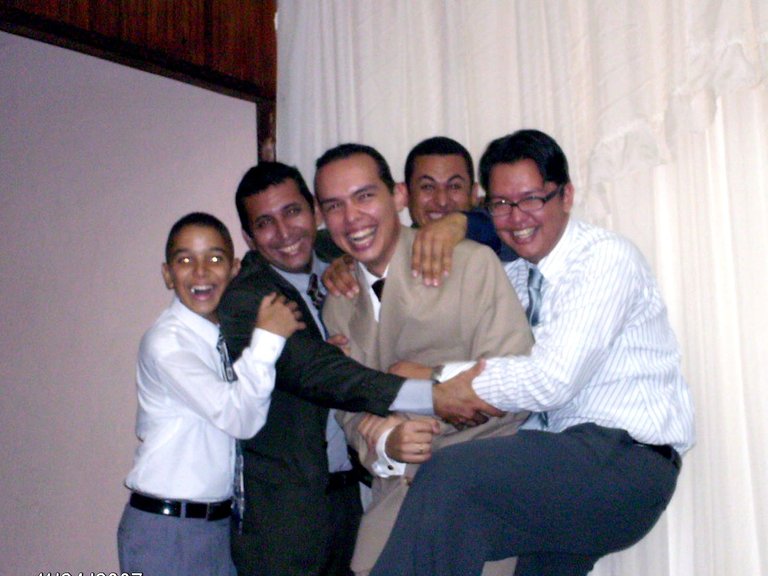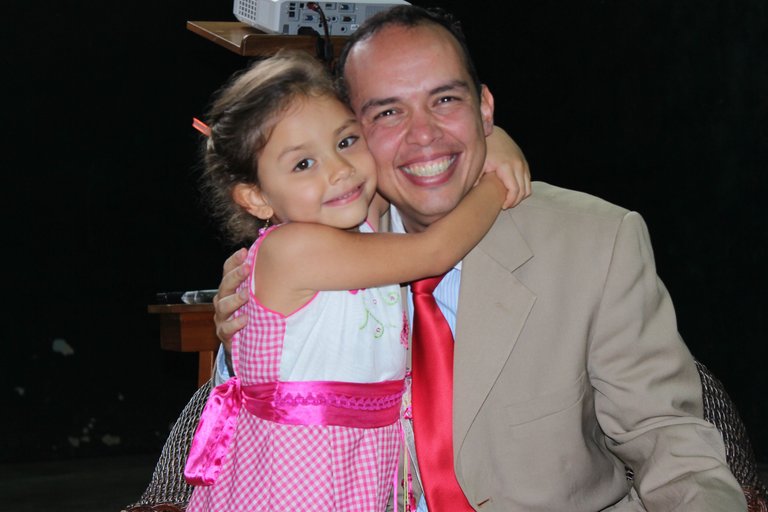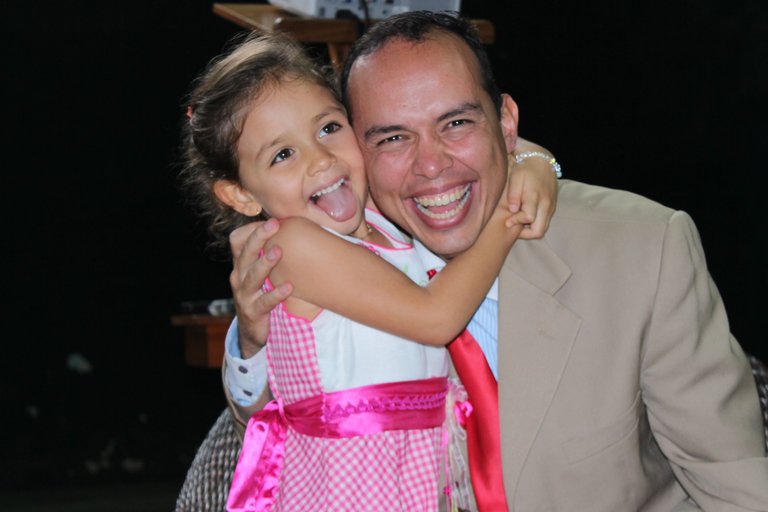Affection - Hugs yesterday and today || Cariño - Abrazos ayer y hoy
Affection - Hugs yesterday and today || Cariño - Abrazos ayer y hoy
If there are already billions of human beings, is it reasonable to think that there will always be someone hugging somewhere in the world? For me, yes. Imagine: when a mother lets go of her child, there is already an engaged couple watching a movie. When one of them gets up to get more popcorn there is a family member hugging his sick loved one while waiting for his treatment to take effect. And when he gets up because the doctor has arrived, in another part of the world there are several people welcoming a friend who has returned from a foreign country. And when this welcome is over, there is a sad farewell to someone who will travel far away and his shirt is wet with the tears of his relatives. Hugging seems to me something very common and normal. But what can make someone practice it infrequently? Can these things be learned? Does it become too late for that? When was it especially valuable to receive and give them?
Si los seres humanos ya alcanzamos los miles de millones, ¿es razonable pensar de que siempre habrá alguien abrazándose en algún lugar del mundo? Para mí, sí. Imagínalo: cuando una madre suelta a su hijo ya hay una pareja de novios que observa una película. Cuando uno de ellos se levanta para buscar más cotufas existe un familiar que abraza a su ser amado enfermo mientras espera que su tratamiento haga efecto. Y cuando se levanta porque llegó el doctor, en otro lugar del mundo están varias personas dando la bienvenida a un amigo que ha vuelto de un país extranjero. Y cuando ésta bienvenida termina, se efectúa una triste despedida de alguien que viajará lejos y se moja su camisa con las lágrimas de sus familiares. Abrazar me parece algo muy común y normal. Pero, ¿qué puede hacer que alguien lo practique con poca frecuencia? ¿Estas cosas pueden aprenderse? ¿Llega a ser demasiado tarde para eso? ¿Cuándo fue especialmente valioso recibirlos y darlos?
Who grew up in a home that lacked affection? Probably many. And I don't mean that "there wasn't", but that there could have been more, that's why I say "lacked". I am one of those. But that will be a topic for another post. The point is that when there is that deficiency it is reasonable to expect that at some point in life it will be noticed. However, that does not mean that you are a failure and it will be impossible to identify, channel and improve this situation.
I like to meet people I call "taught to show affection". It is natural for these people to express their affection through words and deeds. Of course, they started displaying it at a very young age. The benefit to the rest of us is that we learn something new, and we can say: "Ah! That's how you do that. That's what that feels like. That's how you see in practice what I know theoretically. " That includes having the healthy habit of hugging.
I find it funny to remember this with some people who knew me in my childhood: I didn't like to be hugged and kissed very much. For example, some women with whom I am presently in contact remember trying to hug and kiss me when I was a child, and I would dodge them, resist when they tried, and even get annoyed at their insistence. And you know what the best part is? I remember it all! I laugh and mock myself. I plead guilty, Your Honor."
Fortunately, one is not doomed to failure. The current situation is different. I still don't have the maximum grade in this subject, but at least I'm not failing.
¿Quién creció en un hogar donde faltó cariño? Probablemente muchos. Y no me refiero que "no hubo", sino que pudo haber existido más, por eso digo "faltó". Yo soy uno de esos. Pero eso será tema para otro post. El punto es que cuando hay esa deficiencia es razonable esperar que en algún momento de la vida se le note. Sin embargo, eso no quiere decir de que sea un fracasado y será imposible identificar, canalizar y mejorar esta situación.
Me agrada conocer personas a las que yo llamo "le enseñaron a mostrar cariño". Es natural para esta gente expresar su afecto mediante palabras y hechos. Claro, empezaron desde muy pequeños a desplegarlo. El beneficio que obtenemos los demás es que aprendemos algo nuevo, y podemos decir: "¡Ah! Así es que se hace eso. Así es que se siente eso. Así es que se ve en la práctica lo que sé teóricamente." Eso incluye tener la sana costumbre de abrazar.
Me resulta gracioso recordar esto con algunas personas que me conocieron en mi niñez: poco me gustaba me abrazaran y besaran. Por ejemplo, algunas mujeres con las que me relaciono en el presente recuerdan que intentaban abrazarme y besarme cuando era un niño, y yo las esquivaba, me resistía cuando lo intentaban y ante su insistencia llegaba a molestarme. ¿Y saben qué es lo mejor de todo? ¡Qué me acuerdo de todo! Me rio y me remedo yo mismo. "Me declaro culpable, Su Señoría."
Afortunadamente uno no está condenado al fracaso. La situación actual es diferente. Aún no tengo la nota máxima en ésta materia, pero al menos no estoy reprobado.

Evaluating myself, I have long been a natural at hugging other people when I joke with them. I wrap both arms around him, from one of his sides, I may rest my head on his shoulder while laughing or saying something while smiling. This confirms to me that I have been changing the situation. These days, I consider it a little more natural at home, with my friends, and sometimes with strangers. Can you imagine if I still had the same attitude I had as a kid? Just imagining that makes me laugh.
My workspace at home is next to the bedroom door. I'm usually the first one up. And when my wife leaves the room and I'm sitting at the computer, I always catch her in a hug, ask her how she slept, how she's feeling, and anything else as we stretch out our moment. It's a good thermometer to measure how the day will start, isn't it? Also, we look to do this even if he's not sitting there. So I can daily practice this in the mornings, as we do other healthy habits.
I think the pandemic made us value this gesture more. I have seen how many really needed it, as validation, as confirmation of how we feel about them. Those who got sick with COVID-19 deserve a separate chapter. That dreadful idea of "stay away from me because I can infect you" affected many. How comforting it was that they were able to receive those hugs again. And I confess, I hugged some with symptoms because of how bad they felt and somehow brought comfort and hope. By the way, I am still not sick from COVID-19.
Evaluándome, desde hace tiempo suelo abrazar de forma natural a otras personas cuando bromeo con ellas. Lo rodeo con ambos brazos, desde uno de sus costados, puede que pose mi cabeza en su hombro mientras me rio o digo algo sonriendo. Esto me confirma que he estado cambiando la situación. Actualmente, considero que es un poco más natural en mi casa, con mis amigos, y a veces con desconocidos. ¿Se imaginan que aún siguiera con la misma actitud que tenía cuando era niño? Sólo de imaginarme eso me causa risa.
Mi lugar de trabajo en casa queda al lado de la puerta de la habitación. Generalmente soy quien primero se levanta. Y cuando mi esposa sale de la habitación y estoy sentado frente a la computadora, siempre la atrapo en un abrazo, le pregunto cómo durmió, cómo se siente, y cualquier otra cosa mientras alargamos nuestro momento. Es un buen termómetro para medir cómo arrancará el día, ¿no es cierto? También, buscamos hacerlo aunque no esté sentado allí. Así que puedo diariamente practicar esto en las mañanas, como hacemos con otros hábitos saludables.
Pienso que la pandemia hizo que valoráramos más éste gesto. He visto cómo varios realmente lo necesitaban, como validación, como confirmación de lo que sentimos por ellos. En capitulo aparte merecen los que enfermaron de COVID-19. Esa espantosa idea de "aléjate de mi porque te puedo contagiar" afectó a muchos. Que reconfortante fue que ellos pudieran recibir de nuevo esos abrazos. Y lo confieso, yo abracé a algunos con síntomas por lo mal que se sentían y de alguna forma brindarle consuelo y esperanza. Por cierto, aún sigo sin enfermarme por el COVID-19.

I read yesterday's and today's posts about hugging. I invite you to stroll through the community feed so you can read things like the benefits of hugging, how some have managed to be known for it and those feelings involved that make us continue to be aware of missing opportunities. I believe that all those publications that have been rightly accompanied by images that show us immersed in a hug touch the fibers of our heart, inviting us to that healthy contact.
We remain determined that the lack of affection should not condition our present and future. We can always decide to change things and seek to be better. Admitting our shortcomings and attending to them with intelligence and conscious effort will bring us closer to the best version of ourselves. Long live hugs! Undoubtedly, they will exist forever.
He leído los post de ayer y hoy sobre el abrazo. Te invito a pasearte por el feed de la comunidad para que puedas leer cosas como los beneficios de abrazar, cómo algunos han logrado ser conocidos por eso y esos sentimientos envueltos que hacen que sigamos pendientes de desaprovechar las oportunidades. Creo que todas esas publicaciones que han sido atinadamente acompañadas de imágenes que nos muestran sumergidos en un abrazo toca las fibras de nuestro corazón, invitándonos a ése contacto saludable.
Seguimos resueltos a que la falta de cariño no condicione nuestro presente y futuro. Siempre podremos decidir cambiar las cosas y buscar ser mejores. Al admitir nuestras carencias y atenderlas con inteligencia y esfuerzo consciente nos acercará a la mejor versión de nosotros mismos. ¡Que viva los abrazos! Indudablemente, existirán para siempre.
😎

Banner: Realizados por mi en GIMP con imágenes propias y recursos gratuitos de la página pfpmaker.com/ // Banner: Made by me in GIMP with my own images and free resources from the site pfpmaker.com/

¡Me encantan las fotos! Es evidente que hay mucho amor y cariño en tu entorno, pero lo que me parece mejor es el proceso por el cual pasaste, desde un niño al que no le gustaba mucho que lo abrazaran a un adulto que no duda en expresar su cariño a través de un abrazo hacia sus seres queridos.
Concuerdo en que la pandemia nos hizo valorar estos gestos, pero en mi caso particular la distancia con mis familiares me ha hecho valorar los pequeños detalles desde antes que la misma pandemia, pero el aprendizaje es semejante en el sentido de enseñarnos a no desaprovechar las oportunidades que tenemos en acercarnos a aquellos que amamos.
Excelente publicación con buenas reflexiones.
Lo importante es aprender, tal como se extrae de tu comentario. Lo que no hemos hecho en algún punto, lo cambiamos, lo mejoramos, y hace que no llevemos esa materia pendiente. Un gusto saludarte @gabrieladifazio
Bueno, a abrazarse saludos excelente post.
Y no sólo el 21 de enero. Ya hoy es 22 y podemos seguir... Saludos @juberth1983
https://twitter.com/1466004279127388163/status/1617199772992999425
https://twitter.com/1466012566115782658/status/1617202909220933632
The rewards earned on this comment will go directly to the people( @elisaday7, @hive-102879 ) sharing the post on Twitter as long as they are registered with @poshtoken. Sign up at https://hiveposh.com.
Amigo @aaalviarez que gusto leer tu post. Me contenta que estés mejorando tu experiencia con los abrazos y en las imágenes se te ve muy Felíz y radiante. Que bueno es saber todos los beneficios del abrazo. Es realmente importante para la salud física y mental del ser humano y los animales también. Tanto es así que tenemos un día al año para celebrar y recordar que debemos practicarlo con amor y sinceridad. Un placer amigo 🥰😄🤗.
Todos los abrazos y el cariño que me perdí de niño por pensar así, ¿no? Bueno, importa más el presente y seguir buscando ser mejor. Ahora que dices lo de los animales, el perro que vive con nosotros le gusta abrazarnos. Tengo que hacer un post sobre eso 🤣. Saludos @elamaria
Que bueno amigo 🥰🤗😃, eso me alegra mucho. Espero verlo y leerlo pronto.
Saludos @aaalviarez. Qué hermosa y afectiva es tu sobrina, una dadora de fuertes abrazos. Generalmente, los niños suelen rechazar los abrazos y después que crecen gran parte cambiar y son capaces no solo de recibir abrazos también de brindarlos. Qué bueno que tuviste ese cambio positivo. Fue un gusto leerte, que tengas una feliz noche. Un fuerte abrazo.
Tienes razón. Si tenemos una mente abierta podemos aprender mucho de ellos. Quiero mucho a mi sobrina y trato de mostrárselo siempre que puedo. Gracias por pasar por aquí y dejar esta bonita huella aquí @pnessy
¡Qué bonita publicación! En esta vida es posible aprender de todo, incluso a abrazarnos, pues son una muestra de afecto generosa y sin costo alguno. Las ganancias de recibir y dar un abrazo son muchas y tenemos que aprovecharlas siempre. Hermosa tu sobrina, espontánea y muy cariñosa. Los niños no tienen filtro y nos dan grandes lecciones. Estemos siempre atentos con ellos. Me encantó leerte. Saludos y un abrazo fuerte para ti.
Bueno, y así como cuando uno termina un curso y puede aplicar lo aprendido, así me siento al desbloquear estos niveles para seguir mejorando y conservando la alegría. Un gusto saludarte @aurodivys